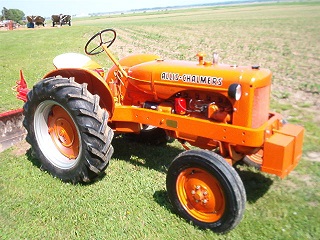https://www.farmcollector.com/company-history/war-production-board-and-farm-machinery/
Farm machinery quotas shifted production
As a result of a 1942 WPB limitation order, quotas for new farm machinery that year were based on only 20 percent of each manufacturer’s total sales in either 1940 or 1941, whichever was higher.
Generally, quotas for smaller producers were higher than those for larger ones, and that forced virtually all production of farm machinery from large companies, such as Deere & Company and the International Harvester Company, to small and intermediate producers, such as Massey-Harris, Allis-Chalmers, Minneapolis-Moline and Oliver. The shift gave the smaller firms a leg up and freed the larger ones, who were better equipped, for heavy war production.
Brand loyalty went out the window as many farmers, to get one of the scarce machines, were forced to switch brands.
A year later, the WPB modified the quotas again, allowing production of 80 percent of pre-war sales. Because most of their production capacity was dedicated to war goods at the time, neither IHC nor Deere could meet these newest quotas.
On the other hand, the smaller companies had no trouble filling theirs because they were not heavily committed to making military goods; having manufacturing capacity to spare, the smaller firms wanted the quota system abolished.
WPB Farm Machinery and Equipment Division
In 1942, Charles Deere Wiman, president of Deere & Company, entered the Army as a colonel and was assigned to the staff of Gen. Levin H. Campbell, chief of ordnance. He worked in the tank and combat vehicle division until 1944, when he was reassigned to the WPB as director of the Farm Machinery and Equipment Division.
The smaller equipment manufacturers, along with machinery-starved farmers and the War Food Administration, called loudly for an end to quotas. Some thought Wiman, and his assistant, Harold Boyle of IHC, favored maintaining the quotas to give their two companies an advantage at war’s end, and this was probably true.
Wiman and Boyle probably didn’t see any sense in allowing the smaller companies to go into the post-war period with more market share than they claimed at the beginning of the war, especially taking into consideration IHC’s and Deere’s patriotic war work.
End to the quota system
Due to political pressure, though, the quota system finally was discontinued, and the smaller farm machinery companies did end up with some post-war advantage as a consequence. In mid-June 1944, Wiman came down with pneumonia and resigned from the WPB, getting himself out of a sticky situation.
All this history paves the way for next month’s column (“Beating Wartime Restrictions“), the story of how Henry Ford and Joe Tucker, of Massey-Harris, each came up with a highly imaginative plan to beat the wartime manufacturing restrictions and to assure themselves a huge chunk of post-war business. One plan succeeded and one failed. FC
Edited by steve(ill) - 06 Aug 2023 at 8:54pm









 Topic Options
Topic Options

 Post Options
Post Options Thanks(0)
Thanks(0)




